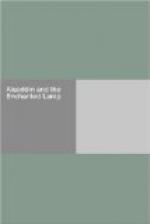[FN#108] Eth thiyab el heririyeh. Burton “silver-wrought.”
[FN#109] Netser ila necshetihim (lit. their image, cf. Scriptural “image and presentment”) wa szufretihim, i.e. he satisfied himself by the impress and the colour that they were diners, i.e. gold.
[FN#110] Lit. I am now become in confusion of or at him (lianneni alan szirtu fi khejaleh (properly khejleh) minhu). Burton, “for that I have been ashamed of waiting upon him.”
[FN#111] Lit. “That which was incumbent on me to him.”
[FN#112] Lit. “go to (or for) his service,” or, as we should say, “attend him.”
[FN#113] Burton, “one of the envious;” but the verb is in the plural.
[FN#114] Night DIX.
[FN#115] Et tsenn er redi. Burton, “the evil.”
[FN#116] So that they might hang down and hide his feet and hands, it being a point of Arab etiquette for an inferior scrupulously to avoid showing either of these members in presenting himself (especially for the first time) before his superior.
[FN#117] Lit., “religiousness or devoutness (diyaneh) was by nature in him,” i.e. he was naturally inclined to respect religion and honour its professors. Burton, “He was by nature conscientious,” which does not quite express the meaning of the text; conscientiousness being hardly an Oriental virtue.
[FN#118] Lit, “I may (or shall) ransom him with m’ life till I (or so that I may) unite him therewith.”
[FN#119] Iftekeret fi rejul.
[FN#120] Terbiyeh. This word is not sufficiently rendered by “education,” which modern use has practically restricted to scholastic teaching, though the good old English phrase “to bring up” is of course a literal translation of the Latin educare.
[FN#121] i.e. “I shall owe it to thee.”
[FN#122] Lit. “It is certain to me,” Constat mihi, fe-meikeni (vulg. for fe-yekin) indi.
[FN#123] Night DX.
[FN#124] Or perhaps “Would I might.”
[FN#125] i.e. the contract of marriage.
[FN#126] See my “Book of the Thousand Nights and One Night” passim, especially Vol. I pp. 190 et seq.
[FN#127] Miheffeh, a kind of howdah with a flat roof or top.
[FN#128] Tekht-rewan, a sort of palanquin drawn or carried by mules or camels wherein she could recline at length. Burton renders Miheffeh bi-tekhtrewan “a covered litter to be carried by camels.”
[FN#129] Burton adds here, “Thou wouldst feel ruth for me.”
[FN#130] Lit. profit, gain (meksib), i.e. the ninth image, which he was to receive as a reward for the faithful execution of his commission.
[FN#131] Night DXI.
[FN#132] [A] nehnu bedna baud an hukm. The word hukm, which commonly signifies the exercise of government or judicial power, is here used metonymically in the sense of the place of dominion, the seat of government. Burton, “Have we fared this far distance by commandment of my bridegroom?”




